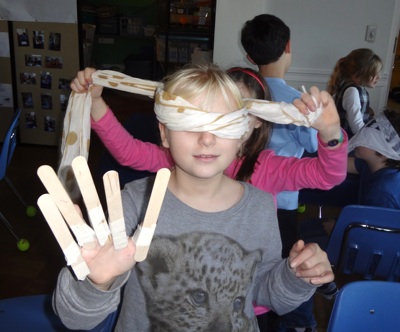 Kyle Hunter is a wizard at turning everyday items into afterschool hands-on science. As an educator at the Morehead Planetarium and Science Center in Chapel Hill, North Carolina, his “Closet of Awesomeness” (the afterschool supply cabinet) has a special stock of recyclables he brings from home, plus a seemingly bottomless supply of “magic wands”—also known as popsicle sticks.
Kyle Hunter is a wizard at turning everyday items into afterschool hands-on science. As an educator at the Morehead Planetarium and Science Center in Chapel Hill, North Carolina, his “Closet of Awesomeness” (the afterschool supply cabinet) has a special stock of recyclables he brings from home, plus a seemingly bottomless supply of “magic wands”—also known as popsicle sticks.In December, popsicle sticks came in very handy as Hunter and his fellow afterschool staff led their students in howtosmile.org’s Robot Hands activity. Students from grades K-5 explored how sensing is part of robotics, by trying to tie their shoes with constraints like popsicle sticks taped to their fingers. The students loved not only trying to tie their shoes, but doing everything with popsicle stick hands, Hunter reports.
Hunter expanded the technology theme with howtosmile.org’s Program a Friend activity. “Kids get more out of the science when they do a couple or a few activities that expand the theme and give them more ways to understand the concepts,” he says. In Program a Friend, one person "programs" another like a robot that must move through a space while trying to avoid obstacles and reach a goal. Fixing problems along the way gives learners firsthand experience at the scientific process of iterative testing.
To engage students who come to the program five days a week, from five nearby elementary schools, Hunter has found he continually needs to expand his supply of activities (and restock his popsicle sticks). He now turns to Howtosmile.org 50-70% of the time for new activities.
Hunter and 19 other Morehead educators also plan and staff special events for afterschool kids and their families. In coordination with the North Carolina Science Festival, the program ran a “Science Night in a Box,” where kids got to show off and teach their parents hands-on activities like Sound Sandwich, one of the most popular activities in the howtosmile.org collection.
Hunter expanded the technology theme with howtosmile.org’s Program a Friend activity. “Kids get more out of the science when they do a couple or a few activities that expand the theme and give them more ways to understand the concepts,” he says. In Program a Friend, one person "programs" another like a robot that must move through a space while trying to avoid obstacles and reach a goal. Fixing problems along the way gives learners firsthand experience at the scientific process of iterative testing.
To engage students who come to the program five days a week, from five nearby elementary schools, Hunter has found he continually needs to expand his supply of activities (and restock his popsicle sticks). He now turns to Howtosmile.org 50-70% of the time for new activities.
Hunter and 19 other Morehead educators also plan and staff special events for afterschool kids and their families. In coordination with the North Carolina Science Festival, the program ran a “Science Night in a Box,” where kids got to show off and teach their parents hands-on activities like Sound Sandwich, one of the most popular activities in the howtosmile.org collection.
No comments:
Post a Comment